Services in Japan
The Japan Productivity Center (JPC) has the following services (Services in Japan) that are available within Japan.
1. Management Consulting
(1)Management Consulting Service
① Structure of the Management Consulting Service
Scope of service
“JPC’s solution center supporting solutions to our clients’ management issues”
| Mission | Provide service with value that contributes to the productivity growth of our clients through consulting & training. (Clients: corporations, public institutions, other associations and organizations) |
|---|---|
| Vision | Aspire to become the leading company among domestic independent firms through consulting activities based on the philosophies of the Department. |
| Business Policy | Gain the trust of individuals and organizations by providing value through our work and build a competitive intellectual working group. |
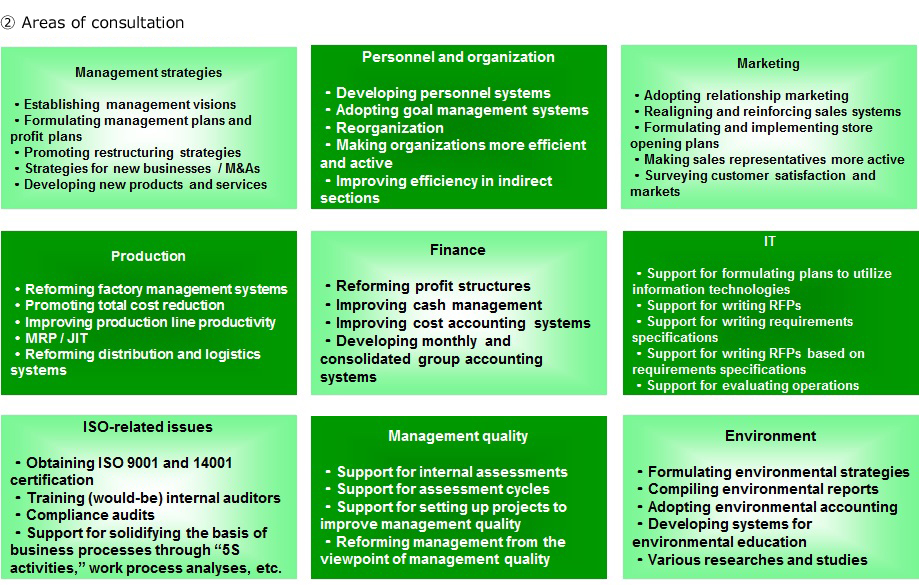
③ Clients & areas of consultation
| ■ Providing a wide variety of solutions to clients | ■ Consulting in 3 areas |
|---|---|
| Categories of business: A wide variety of businesses from manufacturing to services Size of corporations: Hundreds of billions – billions in sales No. of employees: Tens of thousands – under 100 |
(i)Comprehensive consulting (ii)Organization/HR consulting (iii)On-site consulting to increase productivity & improve processes |
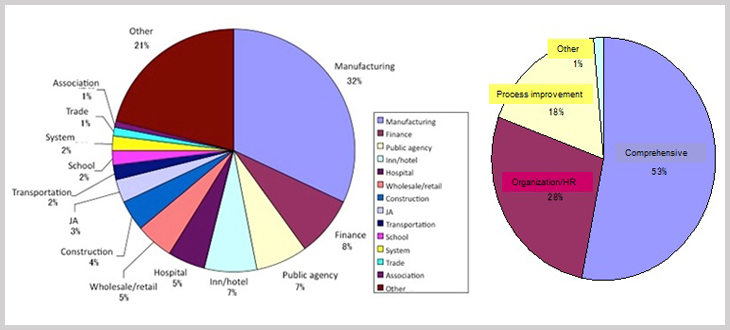
④ Characteristics of consultants
| Management consultants who have full knowledge of corporate management | Management consultants who show examples | Management consultants who help the client stand on its own feet |
|---|---|---|
| All JPC management consultants have the right perspectives and abilities to evaluate the conditions of corporate management. In any reform support project, we grasp the visions and attitudes of the top executives toward their business, occasionally hold candid discussions with them, and place emphasis on consensus building. This process is crucial for us to get the top executives to commit to the reform initiatives. |
However good the proposed ideas, plans and systems may be, the intended reforms will not be realized unless put into practice at the lower level of the organization. If the client is not ready to take action or manage its organization in the desired manner, we do not hesitate to show examples in the reform process. This is why we call the client “our company.” |
Our shared goal is that the “organization grow in a sustainable, autonomous manner.” Achieving this requires time for the client to develop and share the understanding that it must solve issues and exercise creativity as part of its own business. Rather than provide unilateral advice and proposals, we collaborate with our clients to allow them to re-engineer for sustainable growth. |
(2)Consulting Service Based on Management Quality Improvement Program (offers unique support for each type of issues.)
Issue 1: To clarify the critical points of management based on “the point of view of customers.”
<Assessment support>
Our experts will support the self-assessment of clients by conducting “identification of management issues through interviews with top management,” “group discussions to identify issues and documentation of the results,” “observation of meetings and customer relations and diagnosis,” etc.
Issue 2: To clarify the strength of the company to accelerate change.
<Assessment of business to create customer value>
Assess current business activities with specific focus on understanding customers, how customer value is created and supplied so that core issues can be highlighted. Our experts will conduct interviews, attend meetings and provide feedback. They will also support the implementation process.
<Improve communication skills>
Our experts will provide support to improve the client’s skill to activate dialogue and find out “what to do and how it should be done.”
Issue 3: To establish the capability to spontaneously initiate management innovation
<Expert support to produce application>
Our experts will attend internal meetings to produce the Management Quality Report to explain what the different criteria of assessment guidelines are asking and how to describe the current situation. This process will also improve the internal capability to exchange opinions.
<Tailor-made training program for post-assessment period>
Example: Successor training, leadership training, corporate culture innovation, hospitality improvement training
<Post-assessment management consulting by our experts>
Example: Corporate culture innovation, mid-term management planning, department-based costing, marketing strategy, sales innovation, production innovation, support of personnel management, etc.
2. Training Program
(1)Management Academy
JPC’s Management Academy was established in 1965 as the first full-fledged business school in Japan to support the development of industry by cultivating the core human resources of companies and institutions. About 14,000 graduates (Management Academy Masters) are leading activities in the business world. The Academy is the place where academic theories meet with the reality of actual business so that human resources with vision, innovation and practical capabilities are produced. It also serves as the stage to formulate a network that goes beyond groups of companies or industry.
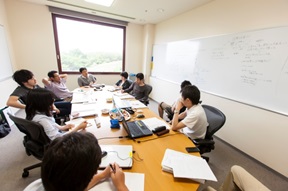
(2)Programs for Executives
The JPC holds seminars and monthly meetings that serves as the venue for executives to collect and exchange information about domestic and international politics, the economy and management. (Karuizawa Top Management Seminar, Top Executive Breakfast Meeting, etc.)
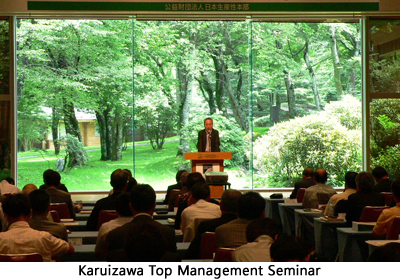
The JPC also has the Art of Management Program, which is a close-up introduction to the life of famous business people and leading personalities in different professions. The Challenge Leadership Program and Global Top Seminar are programs that systematically develop next-generation leaders who can be globally competitive.
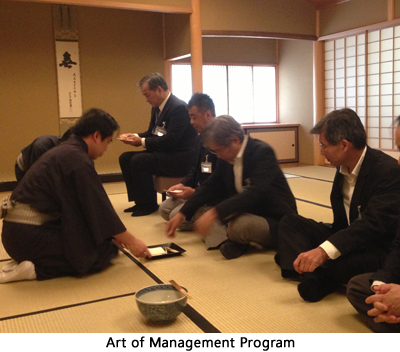
(3)Multi-Level Training
As for the programs designated for different management levels and skill-sets, the JPC runs the New Board of Director Course, High-level Manager Course, Management Discovery Course, Basic Manager Course, Section Chief Course, Middle Manager Revitalization Course, Young Staff Course and New Recruit Course. The new course for Value Creation by General Managers is also to be introduced soon.

(4)Counseling Management
The Counseling Management Center (CMC) was established in July 2002 for the purpose of developing techniques for counseling management and promoting such techniques in companies and labor unions. The eventual objective was to establish a workplace in which people can work in a healthy manner, both mentally and physically and to improve the vitality of organizations. The Center performs mental care management in workplaces, develops and implements educational programs to improve communication, and holds open seminars and tailor-made training programs based on specific requests from individual organizations.
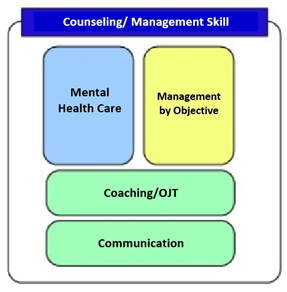
(5)Support Based on Management Quality Improvement Program
These are seminars that address specific management issues and objectives.
Issue 1: To clarify the critical points of management based on “the point of view of customers.”
Management Restructuring Seminar
This seminar focuses on how much value is delivered to customers and explores the ways to provide unique values.
Management System Streamlining Seminar
This seminar is to check the level of progress that has been made towards realizings a certain level of customer value. The specific competency required to achieve the objective will be identified and actual ways to enhance competency will be discussed.
One-point Assessment Seminar
This seminar is to enable self-assessment if a certain business has a USP (unique selling proposition.)
Issue 2: To clarify the strength of the company to accelerate change.
Discovery of String-Point Course
Improving the string point of a company is critical in strengthening the effectiveness of innovation. This course works to understand and improve the company’s strong points and strengthen the company itself.
Strategic Organization Development Course
This course will examine the unique capabilities of excellent companies to learn the theories behind the value-set of the organization, which is necessary in formulating unique capabilities. It also teaches how to acquire, share and expand the value-set in an organization.
Customer Value Innovation Course
In order to boost value, one has to analyze present and future competition and customer value. This course is to learn about the process of changing the business.
Issue 3: To establish capabilities to spontaneously initiate management innovation
Management Innovation Promotion Course
This course is to learn how to actually implement management innovation and promote innovation by deciding on processes schedules and producing plans.
Self-Assessment Course
This course is to develop human resources to promote management innovation (self-assessors) based on the guidelines of the Management Quality Improvement Program.
(6)Study Mission to Japan
Each year, the JPC welcomes over 100 trainees from approximately 25 countries, and offers training in productivity improvement, development of small and medium-size enterprises, labor-management relations, and business management.
3. Productivity Analysis and Research
(1) Japanese Ceustomer Satisfaction Index (JCSI)
The JCSI is one of the largest customer satisfaction surveys in Japan and collects feedback from more than 130,000 users through statistical methods. The JCSI allows for cross-sectorial comparison and analysis of the structure of customer satisfaction and positioning. This year, the survey will be conducted 5 times (conducted 4 times in 2013). This survey has been carried out since 2009 to encourage “cross-sectorial competition that is based on customer evaluation,” to spread management’s awareness on high value added and customer satisfaction, and the eventually improve growth and the international competitiveness of Japanese companies.
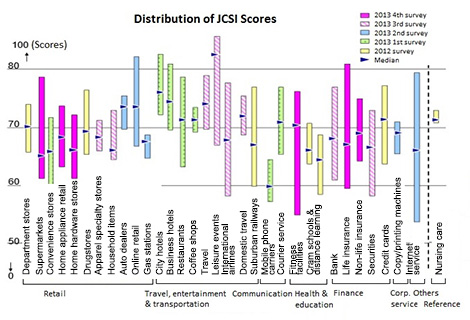
(2) Japan Quality Awards--SME- focused special
The Evaluation System of “Effective Management” is a system to revitalize the management of SMEs through the evaluation of SMEs that implemented Management Improvement Programs developed by the JPC. The CEOs of relevant SMEs will draft action plans to solve pending issues and report the results for the period between April and September. The reports will be graded by a third party on 10 criteria and the committee will certify the SMEs that followed through with the plans and achieved results. The grade awarded will be “Introduction,” “Continuation,” or “Advanced” and if the “Advanced” is awarded, the SME will be deemed ready to apply for the Japan Quality Award organized by the JPC.
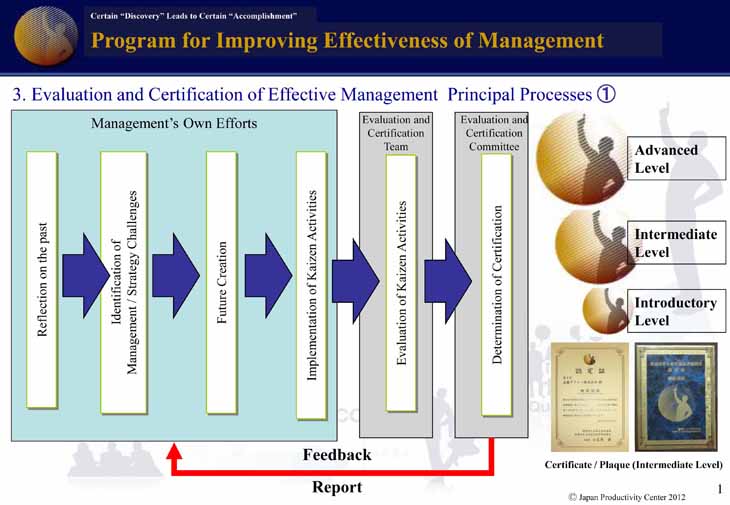
(3) Niser ES: Employee Satisfaction Survey
Niser ES is a survey for which questions were developed from employee satisfaction surveys carried out with the support of METI (Ministry of Economy, Trade and Industry.) The survey can be conducted through the Internet and has 13 fields and 63 questions that cover the employer, workplace and work. The survey also allows for up to 20 additional questions. As an option, our management consultants can provide advice on the adequacy of additional questions.

(4) Japan Mental Health Inventory (JMI)
The JMI (Japan Mental Health Inventory) Survey is a periodical mental health survey system that was developed in 1980. To date, over 3 million people from about 3,000 companies have been surveyed by this highly praised system. The most unique feature of the JMI Survey is that the system checks both the health of individuals and the client organization at the same time and aims at the improved welfare of both. The Survey not only provides advice to people but also identifies issues in the workplace to create a better working environment.




